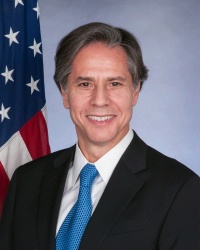Antony Blinken: What Kind of Secretary of State?

While Pompeo is brash, Blinken is humble, and this key difference might play a leading role in repairing America’s damaged reputation abroad after the past four years of current US President Trump’s bombastic foreign policy statements. Nevertheless, this impression shouldn’t be taken to mean that Blinken isn’t decisive.
Democrat presidential candidate and popularly projected winner of this month’s elections Joe Biden announced that he’ll nominate his close advisor Antony Blinken as the US’ next Secretary of State. Blinken is a veteran Democrat expert in the foreign policy field who comes from a family of diplomats. He previously served as Biden’s National Security Advisor when he was Vice-President as well as Obama’s Deputy National Security Advisor and Deputy Secretary of State. The tremendous experience that Blinken will bring to a possible Biden Administration means that the world can expect a return to the US’ Obama-era foreign policy.
Media reports indicate that his personality is the complete opposite of current Secretary of State Mike Pompeo. While Pompeo is brash, Blinken is humble, and this key difference might play a leading role in repairing America’s damaged reputation abroad after the past four years of current US President Trump’s bombastic foreign policy statements. Nevertheless, this impression shouldn’t be taken to mean that Blinken isn’t decisive. Other reports claim that he was in favor of former President Obama bombing Syria during the 2013 chemical weapons crisis, and former US Ambassador to Russia Michael McFaul revealed some other interesting details.
According to the Financial Times in their article titled “Biden’s ‘alter ego’ Antony Blinken tipped for top foreign policy job”, McFaul said that Blinken was part of a secretive group of Democrats called the “Phoneix Initiative”. The former ambassador claimed that they began assembling in 2004 after former Democrat presidential candidate Kerry’s loss to incumbent President Bush Jr. Their debates allegedly consisted of passionate arguments in support of more robust national security strategies, including Blinken advocating very strongly for “human rights” according to McFaul.
This correlates with the US’ Obama-era foreign policy of supporting Color Revolutions and so-called “humanitarian interventions” across the world in countries as diverse as Ukraine and Libya respectively under such pretexts. Observers might thus be worried that these policies could repeat themselves under a possible Biden Presidency, which could in turn be destabilizing for Eastern Europe and the Mideast, especially if those aforesaid processes were weaponized for the purpose of geopolitically containing Russia and Iran. It’s too early to tell whether that’ll be the case, but it’s worth noting nonetheless.
Blinken was also critical of Russia over the past few years and even dramatically claimed in 2017 that “The president’s ongoing collusion with Russia’s plans is really striking, intentional or not.” It’s therefore unlikely that he’ll oversee any improvement of relations with Russia, which is worrisome because the two nuclear powers should renegotiate a new strategic weapons treaty after the New START expires early next year. Failing to do so for reasons possibly related to Blinken’s groundless suspicions of then-former President Trump’s relations with Russia (which were never proven despite several years of investigations) would worsen global insecurity.
On the topic of Iran, however, he seems to be much more pragmatic. Blinken supported the 2015 nuclear deal and would likely see the US attempt to return to it under a possible Biden presidency. While that might repair American-Iranian relations, it could also inadvertently worsen the US’ historical ties with Israel and Saudi Arabia, both of which are totally against the agreement. Still, it would represent a symbolic return to the UN-enshrined rules-based order if Blinken were to oversee the US’ return to that pact. Thus far, it can be concluded that he’d probably be harder on Russia but more flexible with Iran, but his stance towards China is unclear.
The same earlier cited Financial Times piece reported that Blinken told an interviewer during a recent podcast that “the US had to rebuild alliances to tackle the ‘democratic recession’ enabled by Mr Trump that let ‘autocracies from Russia to China . . . exploit our difficulties’.” This suggests that he might share some of his predecessor’s suspicions of China and thus be less pragmatic towards it than some had initially hoped after first hearing that Biden was projected by the media to be the next President-Elect. His ideological views towards governance hint that he might even try to strengthen the US’ regional alliances on a “democratic” basis.
It can only be hoped that Blinken wouldn’t let his personal opinions blind him to the fact that the US has no choice but to pragmatically cooperate with China despite those two countries’ different governing systems. Seeing the world in black-and-white terms of us-versus-them with respect to democracies versus what he regards as autocracies would be the wrong way to approach relations with the People’s Republic. It might even result in a possible Biden Administration ruining the chance to enter into a comprehensive rapprochement with China towards what some have predicted could even become a New Detente between the two if successful.
*
Note to readers: please click the share buttons above or below. Forward this article to your email lists. Crosspost on your blog site, internet forums. etc.
This article was originally published on OneWorld.
Andrew Korybko is an American Moscow-based political analyst specializing in the relationship between the US strategy in Afro-Eurasia, China’s One Belt One Road global vision of New Silk Road connectivity, and Hybrid Warfare. He is a frequent contributor to Global Research.

